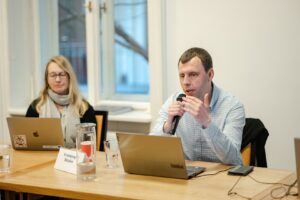Course description: The course explores the history of Russia as an empire from Peter I up to now in the methodological perspective of the new imperial history. What are the historical preconditions and sources of Russian imperialism and militarism? How did the small principality of North-Eastern Europe manage to create the largest empire in the world? To what extent the Russian Empire of the 18th and 19th centuries differed from European colonial empires as well as eastern imperial polities such as Ottoman Empire and China? How did the imperial nationalities policies emerge and evolve? What role did the competition between “great powers” play in turning Russia into an empire?
The course attempts to answer these questions through the examination of several key themes of modern Russian history such as making of absolutist and autocratic political regime, persistence of serfdom, the role of external and internal colonization, emergence and evolution of Russian nationalism and imperialism. The special attention will be paid to the transformation of imperial ideology in the USSR, and to its reclaiming and reformulation in Putin’s Russia.
Course requirements: Attendance is mandatory. Students are expected to read assigned readings carefully and participate in the discussions. A 3-5 pages final essay “Was Ukraine a Russian Colony?” is required (deadline for submission is May 15). The essay should engage the debate on the supposed colonial status of Ukraine in the Russian Empire and/or the Soviet Union. Please provide and justify at least 3 arguments for and against the colonial status of Ukraine and reflect on the need of the decolonization in today’s Ukraine. The grade will be composed of the following elements: seminar presentations – 20%, participation in seminar discussions – 55%, final essay – 25%.
Selected bibliography for the final essay:
- Stephen Velychenko, Fish or Fowl? What Was Russian-Ruled Ukraine? https://www.historians.in.ua/index.php/en/doslidzhennya/2805-stephen-velychenko-chair-of-ukrainian-studies-university-of-toronto-fish-or-fowl-what-was-russian-ruled-ukraine#edn80
- Mykola Riabchuk, White Skins, Black Languages: Traumatic Experiences of Colonial Subjugation, in: Ireland and Ukraine: Studies in Comparative Imperial and National History, ed. by Stephen Velychenko, Joseph Ruane, Liudmyla Hrynevych. Stuttgart, 2022, pp. 103-134.
- Andreas Kappeler, Mazepintsy, Malorosy, Khokhly: Ukrainians in the Ethnic Hierarchy of the Russian Empire, in: Culture, Nation, and Identity: The Ukrainian-Russian Encounter (1600-1945), ed. by Zenon Kohut. Edmonton and Toronto, 2003, pp. 162-181.
- Myroslav Shkandrij, Russia and Ukraine: Literature and the Discourse of Empire from Napoleonic to Postcolonial Times. Montreal and Kingston, 2001.
- Marko Pavlyshyn, Post-Colonial Features in Contemporary Ukrainian Culture, Australian Slavonic and East European Studies, 1992, no 2, pp. 41-55.
- Joseph Ruane, Theorizing Ireland’s Colonial Dimension: Implications for Ukraine, in: Ireland and Ukraine: Studies in Comparative Imperial and National History, ed. by Stephen Velychenko, Joseph Ruane, Liudmyla Hrynevych. Stuttgart, 2022, pp. 203-236.
- Oleksii Yas, Representation of Ukraine as Colony in Ukrainian and Russian Historiography, in: Ireland and Ukraine: Studies in Comparative Imperial and National History, ed. by Stephen Velychenko, Joseph Ruane, Liudmyla Hrynevych. Stuttgart, 2022, pp. 159-176.
- Станіслав Кульчицький, Чи була Україна російською колонією в царські і радянські часи?, in: Academia Terra Historiae. Студії на пошану Валерія Смолія, ред. Геннадій Боряк. Київ, 2020, т. 2, с. 584-594.
Note: readings marked with an asterisk are not compulsory.

